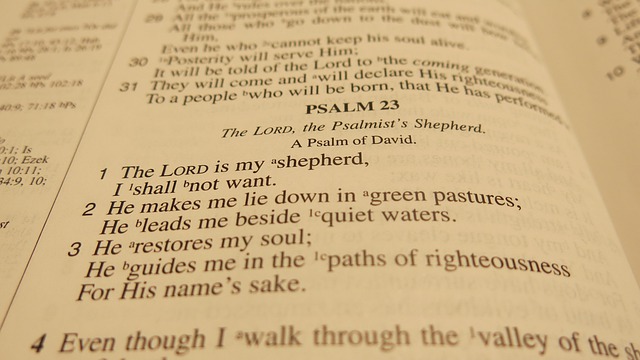He sits at a table with parchments before him, the familiar quill in his hand. His chambers are not in an unimaginably ornate palace like his son would one day build. Nor do they in any way rival the splendor of Egyptian or Assyrian or Babylonian kings. But it is spacious enough with comforts enough, reflecting his position as monarch of a kingdom stretching from Elath at the tip of the Red Sea to the Syrian deserts far north of Damascus.
Since his days as a shepherd in the hills of Judea, David has written his songs and poems and prayers:
The Lord is my shepherd; I have all that I need.*
There were those early years of running from Saul. Fear, hunger, exhaustion, and the constant, pressing responsibility of forming a band of hard men with hard histories into a skilled and loyal fighting force:
I will give thanks to you, Lord, with all my heart. The Lord is a refuge for the oppressed, a stronghold in times of trouble.**
He had finally assumed the throne, consolidated the kingdom. Well trained armies led by seasoned men now kept the borders intact. His people enjoyed peace and safety. He had written:
How priceless is your unfailing love, O Lord! The children of men take refuge in the shadow of your wings. You feed them from the abundance of Your own house, letting them drink from your river of delights. For with you is the fountain of life. In Your light we see light.***
Yet here he is, alone. As the light of day withdraws from the room, the familiar presence of His God seems to withdraw as well. How long has he been sitting, motionless? He looks down and sees pools on the parchment where tears have leaked down his beard. Slowly, he dips the quill in a pot of ink, as though dipping in his own life’s blood:
Have mercy on me, O God, according to Your unfailing love; according to your great compassion blot out my transgressions. Wash me thoroughly from iniquity, and cleanse me from my sin.****
The prophet has visited him:
For I know my transgressions and my sin is always before me.
It is as though a dark mist is lifting and the enormity of what he has done appears in stark relief:
Against You, and You only, have I sinned and done what is evil in Your sight.
Soiled, stained, disgraced, he thinks of the Fullers Guild, those who wash garments down by the Gihon Spring. No gentle kneading of materials, but beating them and stamping on them with white clay and ashes until they are whitened and clean:
Wash me thoroughly . . . cleanse me . . . purge me . . . deliver me . . . restore me.
~~~~~~~~~~~~~~~~~~~
When I arrive at Psalm 51, I see this scene. It burns with guilt and remorse, pouring from a broken spirit. It is to be read slowly, prayerfully.
One of the remarkable things about this remarkable psalm is the progression:
- Acknowledgement of guilt,
- through a deep repentance,
- to absolute confidence that God heard, would forgive, and ultimately restore.
It remains a template for every one of us as we navigate life and wash up at times on some sandbar of transgression. But now we call on Christ Jesus whose blood from his beaten body cleanses us, as John wrote, from all sin. (I John 1:7)
And there is more to consider. David’s remorse for his sins of adultery and the arranged murder of a valiant warrior appear throughout his later writings. More seriously, the effects ripple through his family: murder, incest, revenge, betrayal—his later years were rife with sorrow.
This has no bearing on God’s forgiveness. God forgives. But the memories can haunt us. We would do well, like David did until the end of his life, to continue to turn to God, seek Him, cling to Him, trust Him. He bears our griefs and carries our sorrows with us. He shares the load, making the unbearable bearable.
Toward the end of his life, David wrote Psalm 37 where he reveals yet again his reflexive posture of a trusting heart:
The steps of a good man are ordered by the Lord, and He delights in his way. Though he fall, he shall not be utterly cast down; for the Lord upholds him with His hand. . .and does not forsake His saints.
God’s grace remains greater than our sin. And stronger than our memories.
*Psalm 23:1
**Psalm 9:1a, 9
***Psalm 36:7-9
****Psalm 51, and following verses

